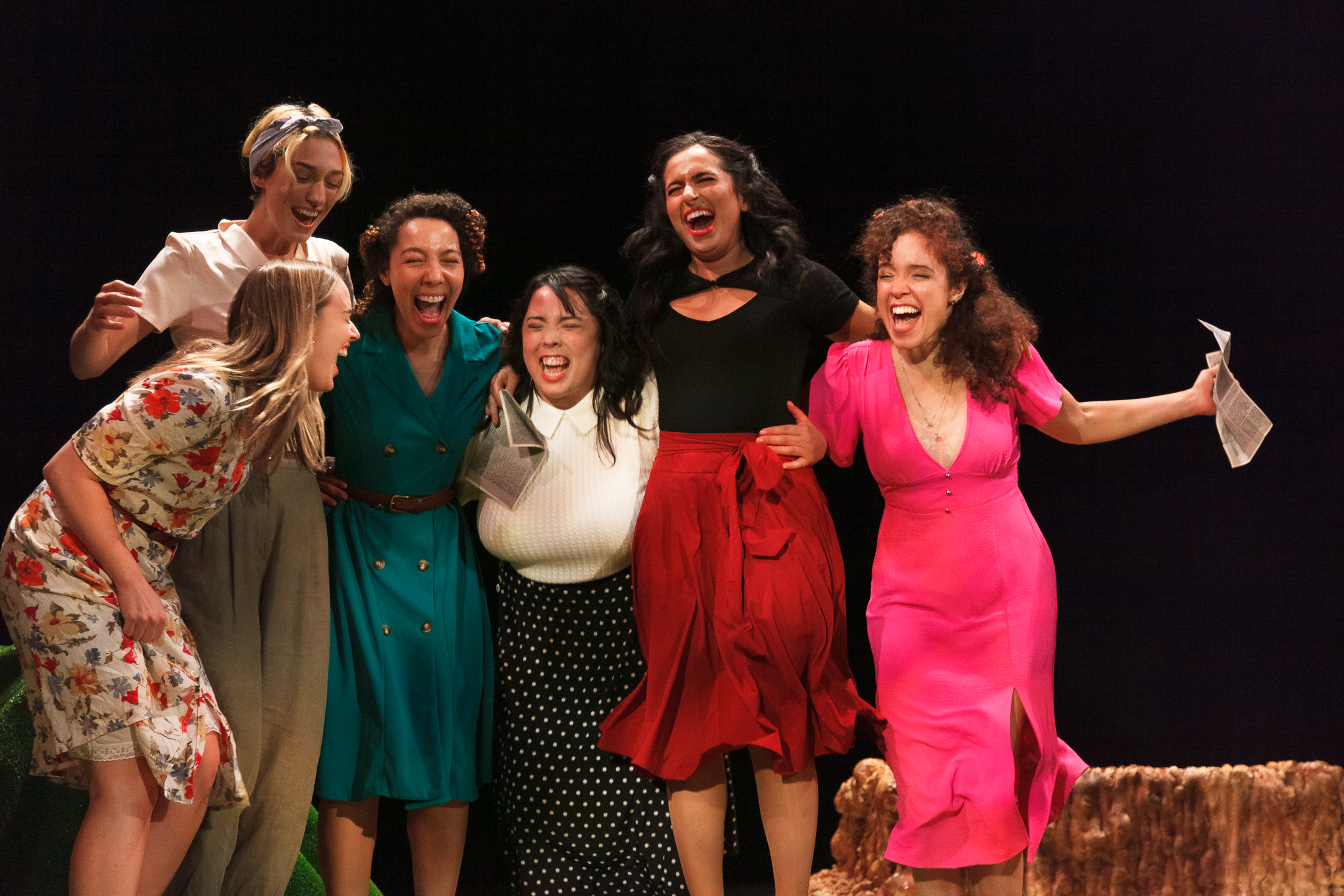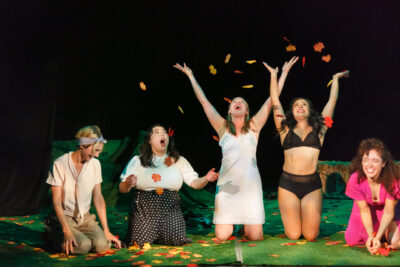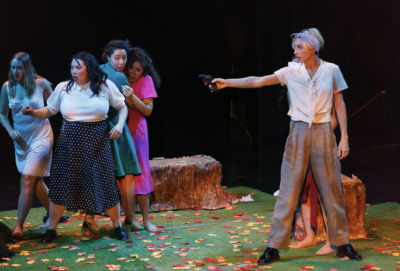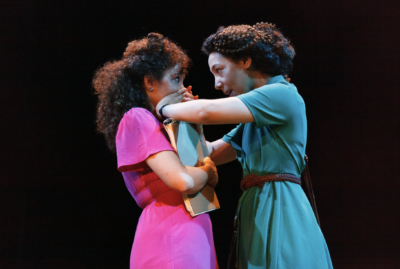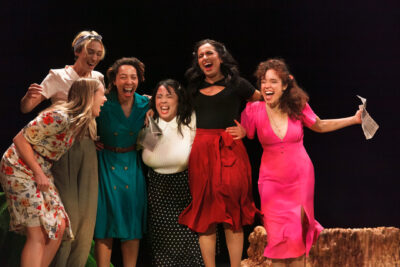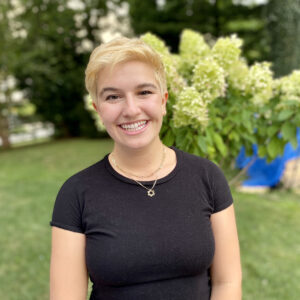The Moss Maidens is not like other shows about World War II: It’s a play about Dutch teenage girls seducing and murdering Nazis.
And it’s based on a true story.
With young girls as the protagonists, this is a tale of those who are overlooked and underestimated, weaponizing their youth, gender and sexuality to play a key role in the resistance.
“At a time when women are having their rights taken away left, right, and center and there is a rising tide of anti-Semitism, this story feels really relevant. And I think there is a lot of anger amongst young women right now. I think it will be cathartic for both the audience and the performers to see women rage,” says S. Dylan Zwickel, the NYC-based playwright.
And Zwickel was correct: The play is part of the SheNYC festival, and was one of eight plays to be chosen out of 300 submissions. After selling out three performances, The Moss Maidens has made history by being the first show to be renewed for a fourth performance.
New Voices Magazine sat down with Zwickel, and two of the show’s Jewish actors, Rebbekah Vega-Romero (Rini) and Sydney Kane (Helena, Associate Producer) for an exclusive conversation about all things The Moss Maidens – from Judaism and justice, to gender and sexuality.
New Voices: Tell us about the story and inspiration behind The Moss Maidens.
Dylan: It’s based on the true story of teenage girls in the Netherlands in the early 1940s, who went into bars to flirt with Nazis, lured them into the woods, and then murdered them as part of the underground resistance. I read this book, Seducing and Killing Nazis [by Sophie Poldermans], and immediately thought “I have to tell this story. This is my thing to write.”
Rebbekah: My character, Rini, is the youngest of the girls, and the protagonist. She’s based on Freddie Oversteegen, who was just 14 years old when the war started. She was so young, yet she was unabashed in her moral code. These women really had one of the most stringent moral codes in all of the resistance across Europe. They were so specific, so careful in how they handled their mission – at a great personal cost. They had to get up close and personal to learn people’s identities. As is the case with women fighting injustices, their story has not been celebrated or remembered in as grand a manner as men in the resistance. I hope this play is part of changing that.
Dylan: And it was essential to me, in writing this play, for women to be able to behave in ways they’re not “supposed” to behave. At the beginning, I made a list of all the ways a girl could be called inappropriate: it always came down to being too much of something, or too little of something. Then, I assigned a handful of each of those attributes to each character. I wanted to have young women do things on stage that they don’t get to do – on stage or in life: be violent, be sexual, really enjoy themselves sexually. Often on stage, girls have to look nice and suffer silently, with very few chances to be active. I want my girls to do a cannonball into a pond.
New Voices: SheNYC is a festival showcasing “new, original works by gender-marginalized writers, composers, & directors”. What is it like being a part of a group and festival with this kind of mission?
Dylan: It’s been very emotionally intense working with this content. Living in this country today, it’s been emotionally draining in a way I didn’t expect. But working on this show, with this cast, has been my happy place.
Nearly every person in the cast is queer, Jewish, a person of color, or disabled or neurodivergent. Many of us hold multiple of those identities. Even though not all of us are Jewish, all of us would have been under threat in Nazi Europe. There’s this catharsis in getting to kill nazis on stage, knowing they would have wanted to kill you.
It’s also been so freeing to not have the restrictions of the male gaze, and things have gotten pretty witchy. We’ve bonded so much – I’ve probably missed 100 texts in our group chat just during this interview.
Sydney: We have found a true sisterhood in this project. Being around these people has been one of the most amazing experiences in my life. Especially given the political climate that we’re living in, acting in this show has brought me hope and love for art again.
Rebbekah: We’re constantly laughing with our castmates in rehearsal. When you’re doing such heavy material, there needs to be levity. There is this element of “oh, we’re just girls talking about hair and makeup!” and then we’re plotting assassinations of very bad people. There’s the element of absurd, joyful humor in the midst of all the horror.
There’s also a queer narrative in the play, and it’s so exciting to tell that story… no spoilers, though!
Dylan: We do talk about how one of the characters, Isa, would probably identify as genderfluid or nonbinary if she were alive today. In the show, Al [Groppi] really explores both the masculine and feminine sides of this character.
New Voices: What has this experience been like for you as Jewish actors and writers, and how does your identity inform your work?
Dylan: I would say I’m culturally Jewish, but not super religious. Growing up, my favorite story from Hebrew school was the story of Yehudis (Judith) – I just love tales of women using their sexuality to murder horrible men. When it comes to World War II, as a Jewish person, it can seem like only stories we’re allowed to tell are stories of suffering and persecution, and it’s cathartic to write a story about fighting back. Even though the characters are not Jewish, the morality of this play is so Jewish – the theme of tikkun olam is very present.
Rebbekah: There are so many moments when you can feel a Jewish moral compass is being demonstrated. I think seeking out and fighting injustice is one of the core values of being a Jew.
My Jewish identity, and every aspect of my identity, comes with an asterisk. On one hand, being mixed-race – in the theater industry and in the world at large – can feel like you’re receiving hate on all sides. It feels like you’re never going to be white enough, black enough, Latina enough, or Jewish enough. But on the other hand, I’m able to find a connection to lots of different types of people. It feels like it allows me to have superhuman empathy.
Sydney: As a Jewish actor, you get comments like: ‘Are you Jewish enough? You don’t even look Jewish. You look too Jewish.’ I was told many times that I needed to change myself, I was told to get a nose job. Through this experience, I’m realizing that you don’t have to change yourself to fit in. You will find a space where you fit in. Or it will find you. Or you’ll create it yourself.
New Voices: How does this play address the topic of antisemitism, then and now?
Rebbekah: When I read over the play, I started weeping – it felt so personal and real to what is happening in the world right now.
There was one weird moment in rehearsal when we put our costumes on for the first time. My co-star was wearing a Nazi costume, and I was like: “Oh my god… I have to kiss you, and you’re wearing a swastika.” Some of it is really hard to grapple with.
Sydney: It really is about the public grappling with antisemitism.
And it’s also more than that. The teenage girls [in the play] wonder: “why do I have to be a part of this?” My character, Helena, wants to go to America and be a movie star. Her storyline really asks the question: what’s the line between selfishness and safety? At what point do you do something just for you, and at what point do you sacrifice for others?
Growing up in Texas, I was always one of the only Jews. I saw a lot of people stay silent because they didn’t know what to do or say. But we would rather you say something than do nothing, even if you’re not sure if it’s the right thing.
It’s about learning why it matters to fight for people that aren’t like you.
New Voices: What do you hope audiences will take away from the performance?
Rebbekah: Everything I do is for the little mixed race girl sitting in the crowd, to realize there is space for them to share their magic with the world. I think about the young artists who will get to come into contact with this work. None of the scenes are focused on “why doesn’t this boy like me?” – This is material that asks the kinds of meaningful and deep questions my friends and I are asking. I wish I had seen this when I was 11.
Dylan: Absolutely. And it’s important that the protagonists are teens. I love that teens will do things that adults just won’t do: I love the bravery, the lack of self-preservation instinct. I hope it inspires young women to step into their power, and shows that there is not just one way to find it. This is a show where each of the characters is very different, with their own unique strengths.
So much of the play is about what ordinary people can do to stand up to things they see that are wrong. After the first performance, I received an email from someone who had seen the show that said: “It’s a reminder to us all not to be sheep.”
If that’s what someone is taking away from this, I think I’ve done my job right.
Photos by Cathryn Lynne
